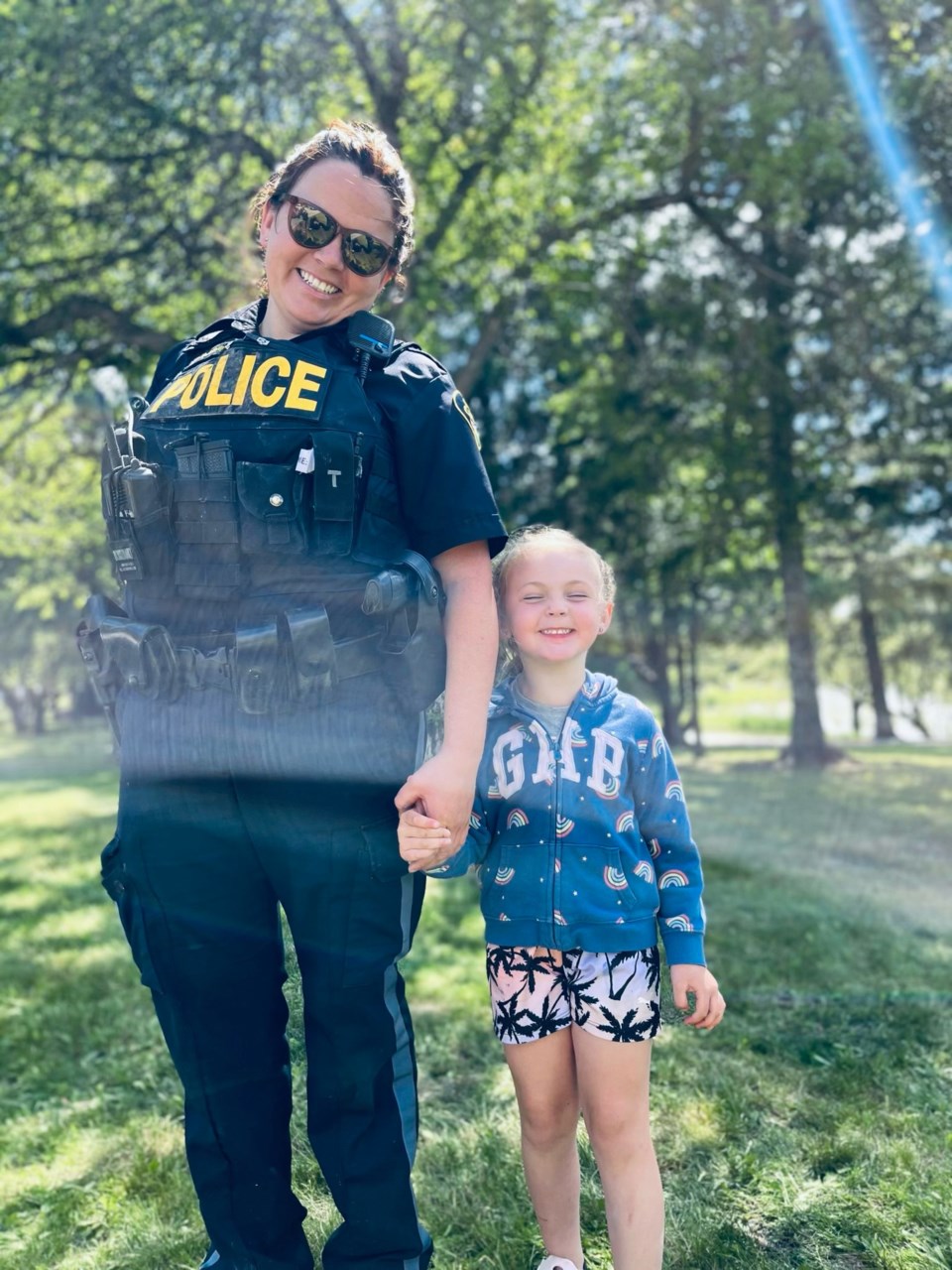As an OPP officer in Dryden, Brittney Bembeneck works to bring the community together while also ensuring safety.
Bembeneck, who is currently a community engagement officer, was born in Dryden and spent much of her early years playing youth hockey on the small city’s streets until Grade 10.
She left Dryden to attend Athol Murry College of Notre Dame’s co-educational secondary bordering school in Wilcox, Sask., where she played Notre Dame’s hockey team. After graduating high school, Bembeneck continued to play hockey with the NCAA for the Superior-Wisconsin Yellow Jackets while attending university.
After her hockey career, Bembeneck had to figure out her next steps. Travelling had its allure, as it does for most young adults who want to experience the world before settling down into a full-time career, but she found a summer job working for the Ontario Provincial Police and the Dryden Police Service.
“I thought, what better way to give back to my community than to try and become a police officer,” Bembeneck said.
“My grandfather retired as an OPP corporal and so I always kind of had that little inkling that I wanted to follow in his footsteps.”
She admits that at a young age, policing wasn’t her calling, with living the dream of playing hockey consuming her so youth.
But during her time working her summer job with the Dryden Police Service, which is now under the management of the Ontario Provincial Police, Bembeneck thought fondly of her youth when Dryden’s community engagement officers would speak to her class about community safety.
It was this feeling of purpose and nostalgia that led her to join the ranks of the Dryden police.
Policing deals with much more than the standard idea of catching criminals or issuing citations. Although, officers are trained to police their communities by investigating service calls and watching roadways for offenders, it is their community service work that isn’t often highlighted.
The job of a community engagement officer is to look at crime prevention from another perspective. It includes being a fixture within the community by facilitating outreach programs for youth, delivering life-saving and well-being campaigns, and organizing volunteer-driven operations that bring positive change to their communities.
“I like being part of the community,” Bembeneck said. “The one thing I think is important is that I get to go and interact with people in our community in a positive way, and hopefully if they do have any bad feeling against the police, we can kind of change that opinion.”
Her interactions with stakeholders, agencies, organizations, and citizens allows her to create an open dialogue.
“Having those positive interacts is important,” she said. “Asking them, what can we do better in this community? What are we doing great? How can we partner together to make things in the community we are both working in better for all the residents that we do serve?
One such organization is the partnership between police and the Dryden Native Friendship Centre.
“Cheryl Edwards and her staff have so many different community resources that they are able to offer to everybody in the community and the surrounding area. We are able to call on them to help us when we think that someone can use the service that they provide,” she said.
Bembeneck’s position allows her to help connect those who are struggling with mental health, addiction or homelessness, and the organizations that can provide services.
“In my position, I get to do a lot of that reaching out to different organizations and saying, “hey, we have this individual that struggling with housing,” for example, or “they’re struggling with mental health. Can you come down to the detachment? Can you come to meet them?” and maybe it’ll break that barrier and be that step forward that this person needs,” said Bembeneck.
Another aspect of Bembeneck’s role is highlighting the officers that serve the community through traditional and social media like investigations and the proactive achievements of officers. She showcases a distinction between the role of an officer and the civic duty of a citizen.
“I think it’s important for the community that we serve to recognize that we are police officers, but we’re also part of the community that we are all living in,” she said . “I really, really love doing that part of my job.”
Although Bembeneck admits her job is fantastic, there are some parts of the job that is hard to separate from other parts of her lifestyle.
“I know when I was working shift work, one of the struggles of having a young family was how to manage family life and shift work life,” said Bembeneck.
When it comes to being a female police officer, Bembeneck doesn’t see a line of division between herself and the male officers that are a part of her team.
“We are all able. No matter what our gender, no matter what our race, we are all able to bring so many different things to the table to help in responding to calls for service. Responding when people are in crisis. And I think another great thing to highlight is that there are so many female police officers now that are doing jobs that maybe 20 years ago that you may not have seen females in those roles," she said.
"We have females that are on our emergency response team. We have female K-9 handlers. We are really showcasing those females can bring a lot to this table and I think that’s because of the work that the OPP does. They support and encourage people to find what they are interested in and they support them to try and get into the role that they are interested in."



